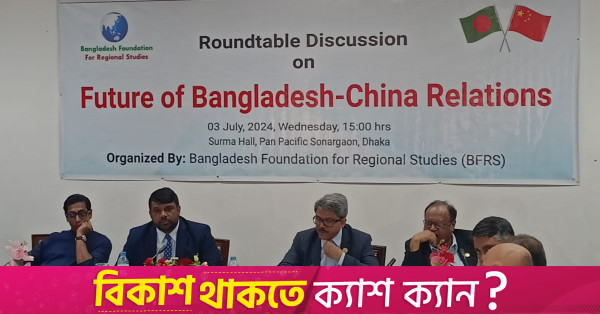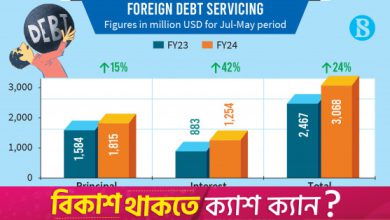Bangladesh needs China for its rapid industrialisation: Shahriar Alam


“Industrialised Bangladesh needs China,” he opined and noted that Bangladesh-China relations have deepened over the last decade
Former state minister for Foreign Affairs Md Shahriar Alam speaks at a roundtable discussion on Future of Bangladesh-China relations organised by the Bangladesh Foundation for Regional Studies (BFRS) on Wednesday, 3 July. Photo: UNB
“>
Former state minister for Foreign Affairs Md Shahriar Alam speaks at a roundtable discussion on Future of Bangladesh-China relations organised by the Bangladesh Foundation for Regional Studies (BFRS) on Wednesday, 3 July. Photo: UNB
Bangladesh needs China for its rapid industrialisation, former state minister for Foreign Affairs Md Shahriar Alam said today (3 July) while underscoring the significant role that China has played over the last 15 years.
“Industrialised Bangladesh needs China,” he opined and noted that Bangladesh-China relations have deepened over the last decade.
Delivering his opening remarks at a roundtable discussion, Shahriar recalled the historical facts during the Liberation War and recognised China’s contributions over the last one-and-a-half decade.
There is no reason to compare Bangladesh’s relations with India and China, Shahriar said as he remembered the historic role of India and shared sacrifice during the Liberation War in 1971.
He expressed displeasure over the propaganda centering Prime Minister Sheikh Hasina’s recent state visit to India.
Bangladesh Foundation for Regional Studies (BFRS) hosted the discussion today moderated by PM’s former Special Assistant Barrister Shah Ali Farhad.
Nahim Razzak MP, former State Minister for Foreign Affairs Abul Hasan Chowdhury, Executive Director of Centre for Alternatives (CA) Prof Imtiaz Ahmed, Prof Shahab Enam Khan of Jahangirnagar University’s Department of International Relations, BGMEA Director Shams Mahmud, Dhaka Tribune Executive Editor Reaz Ahmad, General Secretary of Jatiya Press Club and daily Bhorer Kagoj Editor Shyamal Dutta, OCAB General Secretary Julhas Alam, Prof Rumana Islam, DCAB President Nurul Islam Hasib, former DCAB President Raheed Ejaz, among others, were present.
There are new avenues that have been opened that came up for discussion including export diversification and a possible free trade agreement (FTA).
BIISS Research Director Dr Mahfuz Kabir presented a paper at the beginning of the discussion.
Although Bangladesh-China diplomatic relations were established officially in January 1976, bilateral relations reached a new height since Prime Minister Sheikh Hasina took office for the second term in January 2009, according to a concept note.
Prime Minister Sheikh Hasina’s visits to China in 2010 and 2014 laid the foundation for the current warm relations between the two countries, it said.
Chinese President Xi Jinping’s historic visit to Bangladesh in 2016 elevated the relations between the two countries to a “strategic partnership of cooperation”.
During the said visit, the two countries signed 21 agreements worth around $40 billion. China has become a dependable partner of Bangladesh in terms of infrastructure development, having collaborated on such major projects as the Padma Bridge, the Karnaphuli River Underwater Tunnel, etc. So far, China has helped Bangladesh build 21 bridges, 11 highways covering 550 km of roads, and 27 energy and power projects, with numerous more projects in the development and/or planning stages.
Trade too is flourishing between the two countries. China implemented duty-free facilities on 97% of Bangladeshi products on 1 July 2020. Later, it was increased to 98%.
In the 2022-23 fiscal year, China was Bangladesh’s single largest trading partner, with bilateral trade amounting to $24 billion, of which Bangladesh’s exports amounted to $677 million and imports amounted to $22.9 billion.
Minister of the International Department of the CPC Central Committee Liu Jianchao, during his recent visit to Dhaka, expressed optimism that the forthcoming visit of Prime Minister Sheikh Hasina to China would be very fruitful one.
“I think that the forthcoming visit by the Prime Minister is going to be a very fruitful one,” he told reporters after his meeting with Foreign Minister Hasan Mahmud.
“So we do have a lots of expectations, and I am sure that our two governments and government agencies will work out a general plan for the cooperation between our two countries in time to come,” said the Chinese minister.
He said they had a very in-depth and comprehensive discussion on bilateral relations, the history of the relationship, and friendship.
“Thus, the friendship was cemented throughout these years, nearly fifty years after …since our bilateral relation was established in 1975,” Jianchao said.
He said China shares the interest and holds a strong inspiration, and enthusiasm in working with Bangladesh in its drive for prosperity, for example, the Vision-2041 and the goal to achieve a Smart Bangladesh.
“China remains a brand as a neighbour and a partner for your modernisation drives. So, we will do it within the framework of Belt and Road Initiative,” he added.




